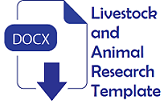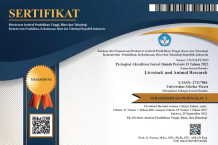Resiliency management of layer poultry farm business during COVID-19 pandemic in the Yogyakarta Special Province
Abstract
Objective: The objective of the research was to identify crises on layer poultry farms specifically in Yogyakarta Special Province during COVID-19 pandemic and investigate business resiliency management to be utilised by the farmers to deal with the situation.
Methods: The research was conducted on Yogyakarta Special Province in April-October 2020 with qualitative approach method and data collection was taken using in depth interview method. Research respondents were 2 layer farmers who were also chairman of farmers association, namely Pinsar Petelur Nasional and 10 farmers purposively selected using snow-ball sampling method. Data collection was taken by face to face indepth and telephone interview and subsequently data was analysed descriptively and by using content analysis.
Results: Layer poultry farmers of Yogyakarta Special Province had faced challenges on their business environment that was becoming business crisis source due to disease outbreaks, natural disasters, monetary crisis, to COVID-19 pandemic. Impacts caused by the pandemic on layer poultry industry of Yogyakarta Special Province affected market demand, distribution, egg price fluctuation and feed price, respectively. Learning through self-awareness on environmental changes and conducting community and organisation coordinations that was PPN and the adaptational management that adopted by farmers to overcome the impact of COVID-19 in business.
Conclusions: Experience and endurance levels were the keys to resolve risks throughout running a farming business is important asset in conducting resiliency management in mitigating impacts of COVID-19 pandemic. Presence of community, group, and organisation networks will be usefull for the growth of capacity and opportunity of farmers in utilising novel and communication technology to negotiate with relevant farming industry stakeholders to maintain the existence of layer farmers in industry during and after the pandemic. Government supports and appropriate policy are also needed in supporting a hospitable business climate for the continuity of layer poultry farms.
Keywords
Full Text:
PDFReferences
- Biggs, D. 2011. Understanding resilience in a vulnerable industry: The case of reef tourism in Australia. Ecol. Soc. 16(1):1-30.
- Korber, S. and R. B. McNaughton. 2018. Resilience and entrepreneurship: a systematic literature review. Int. J. Entrep. Behav. Res. 24(7):1129-1154.
- Herbane, B. 2010. The evolution of business continuity management: A historical review of practices and drivers. Bus. Hist. 52(6):978-1002.
- Tierney, K. J. 2007. Businesses and disasters: Vulnerability, impacts, and recovery. In: Hanbbook of Disaster Research. Handbooks of Sociology and Social Research, New York. Springer.
- Gautier, D., B. Locatelli, C. Corniaux, and V. Alary. 2016. Global changes, livestock and vulnerability: The social construction of markets as an adaptive strategy. Geogr. J. 182(2):153-164.
- BPS DIY. 2020. Provinsi Daerah Istimewa dalam angka 2020. Badan Pusat Statistik Daerah Istimewa Yogyakarta.
- Rani, R. Impact of corona virus on the Indian economy. UGC Care J. 40(60):3618-3626.
- BPS. 2020. Direktori hotel dan akomodasi lain Daerah Istimewa Yogyakarta 2020. Badan Pusat Statistik.
- Wahyono, N. D. and M. M. D. Utami. 2018. A review of the poultry meat production industry for food safety in Indonesia. J. Phys. Conf. Ser. 953(1):1-5.
- Ferlito, C. and H. Respatiadi. 2018. Discussion paper: Policy reforms on poultry industry in Indonesia. Cent. Indones. Policy Stud. In: Center for Indonesia policy studies.
- Wimalawansa, S. J. 2020. Global epidemic of Coronavirus-COVID-19: What can we do to minimize risks. Eur. J. Biomed. Pharm. Sci. 7(3):432-438.
- Soedjana, T. D. and A. Priyanti. 2017. Competitiveness of Indonesian livestock production among ASEAN countries. Indones. Bull. Anim. Vet. Sci. 27(1):1-14.
- Folkers, A. 2019. Freezing time, preparing for the future: The stockpile as a temporal matter of security. Secur. Dialogue. 50(6):493–511.
- FAO. 2015. The impact of climate changes on agriculture and food security. In: Food Agriculture Organization of the United Nations.
- Hong, R.N., T. N. Quang, and D. N. Ngoc. 2018. Effects of natural disaster on rice production at farm level: New evidence from Vietnam. Agris On-line Pap. Econ. Informatics. 10(1):37-49.
- Chapagain, T. and M. N. Raizada. 2017. Impacts of natural disasters on smallholder farmers: Gaps and recommendations. Agric. Food Secur. 6(39):1-16. Doi: 10.1186/s40066-017-0116-6
- Reiter, B. 2017. Theory and methodology of exploratory social science research. Hum. Journals. 5(4):129-150.
- Bruce, A., R. Beuthin, L. Sheilds, A. Molzahn, and K. Schick-Makaroff. 2016. Narrative research evolving: Evolving through narrative research. Int. J. Qual. Methods. 15(1):1-6.
- Tarigan, S. 2015. Infeksi subklinis Avian Influenza H5N1 pada peternakan ayam yang menerapkan program vaksinasi. Wartazoa. 25(2):75-84.
- Yusdja, Y. and E. Pasandaran. 2016. Analisis harga pasar dan bentuk pasar pakan dan kaitannya dengan pengembangan agribisnis ayam ras rakyat. J. Agro Ekon. 15(1):20-40.
- Folke, C., S. Carpenter, T. Elmqvist, L. Gunderson, C. S. Holling, B. Walker, J. Bengtsson, F. Berkes, J. Colding, K. Danell, M. Falkenmark, L. Gordoon, R. Kasperson, N. Kausky, A. Kinzig, S. Kevin, K. G. Maler, F. Moberg, L. Ohlsson, P. Olsson, E. Ostrom, W. Reid, J. Rockstrom, H. Savenije, and U. Svedin. 2002. Resilience and sustainable development: Building adaptive capacity in a world of transformations. In: Scientific background paper on resilience for the process of The World Summit on Sustainable Development on behalf of The Environmental Advisory Council to the Swedish Government.
- Osti, R., D. Zhou, V. Singh, D. Bhattarai, and H. Chaudhary. 2016. An economic analysis of poultry egg production in Nepal. Pakistan J. Nutr. 15(8):715-724.
- Widiati, R., S. Nurtini, S. P. Syahlani, and B. Aryadi. 2017. Analisis investasi usaha ayam ras petelur skala kecil: Studi kasus di Desa Twiwidadi Kecamatan Pajangan Bantul Yogyakarta. Bul. Peternak. 41(4):495-504.
- Taufik and E. A. Ayuningtyas. 2020. Dampak pandemi COVID-19 terhadap bisnis dan eksistensi platform online. J. Ilmu Manaj. Terap. 22(5):21-32.
- Kirschenbaum, A. and C. Rapaport. 2018. Informal social networks as generic contingency plans. J. Contingencies Cris. Manag. 26(4):453-460.
- Sugihamretha, I. D. G. 2020. Respon kebijakan: Mitigasi dampak wabah COVID-19 pada sektor pariwisata. J. Perenc. Pembang. Indones. J. Dev. Plan. 4(2):191-206.
- Ates, A. and U. Bititci. 2011. Change process: A key enabler for building resilient SMEs. Int. J. Prod. Res. 49(18):5601-5618.
- Cote, M. and A. J. Nightingale. 2012. Resilience thinking meets social theory: Situating social change in socio-ecological systems (SES) research. Prog. Hum. Geogr. 36(4):475-489.
- Hanna, R., A. Rohm, and V. L. Crittenden. 2011. We’re all connected: The power of the social media ecosystem. Bus. Horiz. 54(3):265-273.
- Biswal, J., K. Vijayalakshmy, and H. Rahman. 2020. Impact of COVID-19 and associated lockdown on livestock and poultry sectors in India. Vet. World. 13(9):1928-1933.
Refbacks
- There are currently no refbacks.










